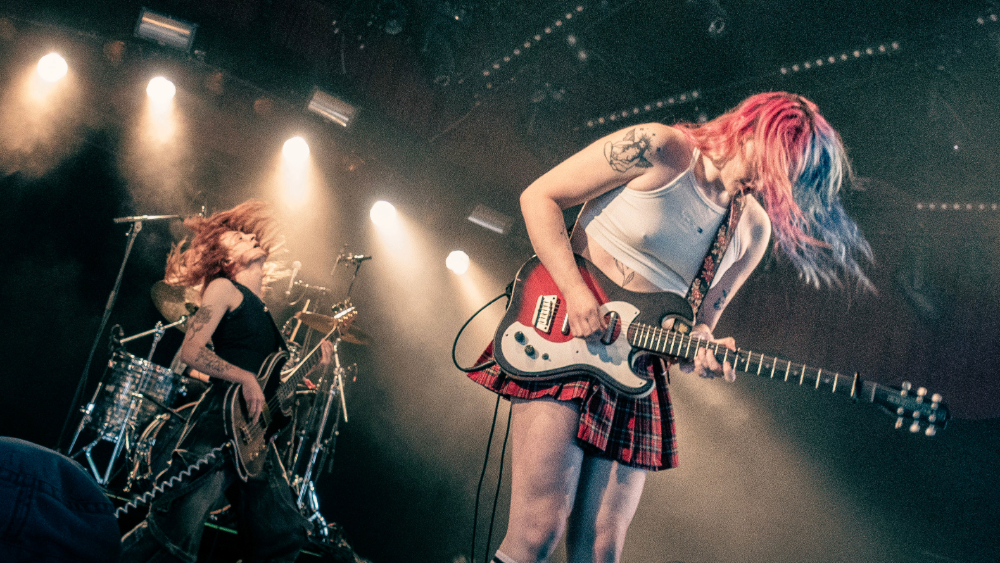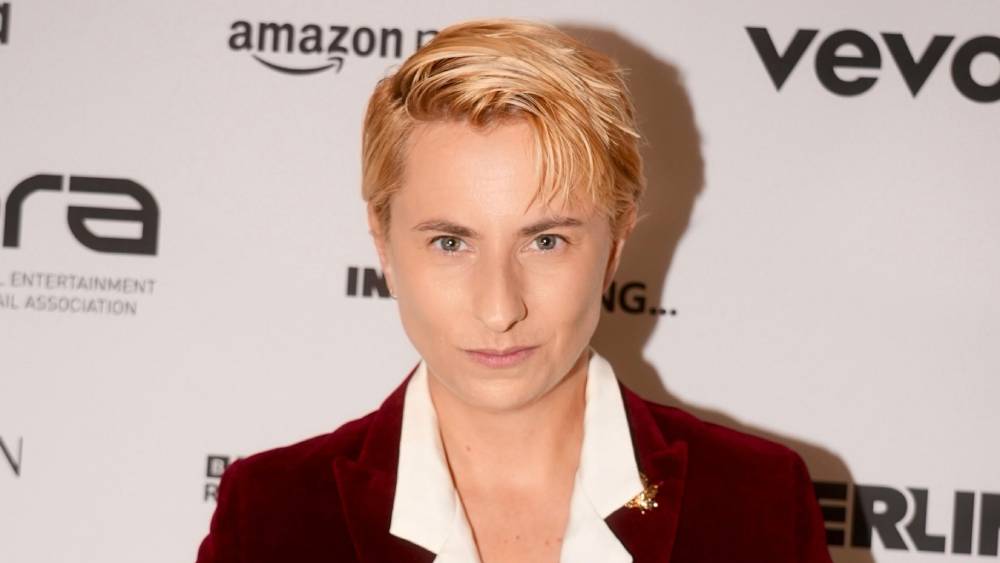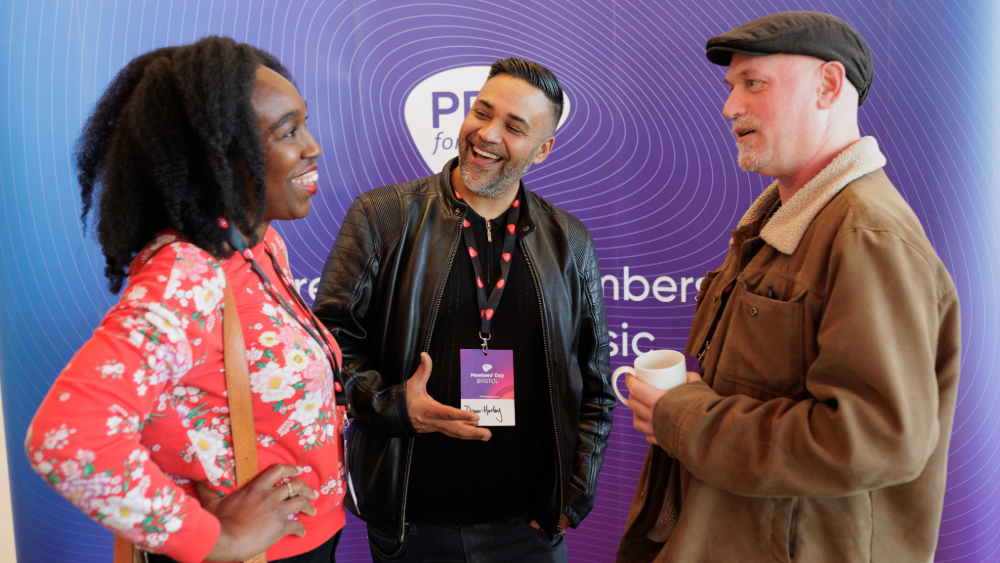The Molotovs’ breakthrough 2025 offers a fierce counterargument to the long-held wisdom that noisy, rhythm-heavy guitar music has had its day. Their songs recall punk at its most pop, nodding to everyone from the Small Faces and The Jam through to modern garage rock fury. They dress sharply, talk the talk and carry a snarl, while the surges and lulls in their jangly melodies are all present and correct.
London-raised sibling teenagers Issey and Matthew Cartlidge began playing guerilla gigs fresh out of lockdown. At the time, Matthew’s own experience of live shows was limited but formative. He recalls, at age 12, being too young to sneak into a SWMRS gig, choosing instead to watch through a back window while standing atop a discarded fruit crate. ‘Every nerve was just electrified,’ he tells M. ‘That’s when it clicked for me. I thought to myself, “Yeah, this is excitement. This is an emotion that you can't replicate anywhere else.”’
This unbridled love of live music has become a central tenet of The Molotovs’ career. As well as playing hundreds of their own shows in the past few years, they’ve also supported the likes of Blondie, the Sex Pistols and Iggy Pop, one of their shared heroes. As the duo’s gig tally continues to increase exponentially, the band have spent the past few months realising some long-held ambitions, amounting to their biggest London headline show to date at Electric Ballroom last month.
There are more major moments on the horizon, too. In January, the band will release their debut album Wasted On Youth via Marshall Records, which they’ll support with dates across Europe. In the spring, they’ll hit the road with former M cover star Yungblud. Matthew met the Yorkshire artist for the first time at the legendary Camden boozer The Hawley Arms in a story akin to an indie fairy tale.
‘When I met him at the pub, he was pouring pints. I waited so I made sure I could get served by Yungblud!’ Matthew explains. ‘He then told me that he loved our band, having seen clips of us online. I didn’t expect any of that. He said, right then and there, that he wanted us to get on his tour.’
For the latest edition of our On The Road series, The Molotovs discuss, in their own words, what it takes to thrive as a live act in 2025.
Main image credit: Derek D’Souza (www.derekdsouzaphotography.com)
Issey: ‘Our band is built on playing live: over the last five years, we've done over 600 gigs. Much of the growth of our fanbase has been based around connection and meeting our fans face-to-face. Electric Ballroom was our biggest headline gig to date; when it's your own gig your emotions can feel hyperbolic, as everything matters all that much more. You want to put on the right show for your fanbase. It feels like we really know who we are as a band now... it really does feel like, "We're here, we’ve arrived."
‘At times it feels like we’re in the eye of the storm. It’s only after a major gig that we can really process things and realise the magnitude of the night and what it means for the band, and what it means for our fans as well. As such, Electric Ballroom felt like it was a real step up. We hadn't played London for a couple months, which is very unusual for us as we used to play here three or four times a week. It was only a couple of days later that the realisation hit — and when it did, it was euphoric!’
Matthew: ‘Gigging constantly has only made us stronger. It's made us play better and dress better. Every sort of attribute related to our band can be put down to playing live — that’s why we are so good at what we do. I sound a bit cocky saying that, but it’s true!’
Issey: ‘We’re telepathic on stage. We've got each other's backs, as if we know everything will always work out. There is this synergy between us — we're just so in the zone that there’s no room for error! But if things do ever go wrong, which they do in live music, then it’s only part of the magic. We always try to feed off the crowd’s energy, which is something you can’t rehearse.
‘Some of our earliest gigs were manic. We set up these shows in a library in Wimbledon and then moved them into Bush Hall [in west London]. They were all-ages gigs and really accessible as the tickets were £3. We’re still in our teens, and we wanted our peers to have an entry point into live music as they wouldn’t be able to get into 18+-restricted venues at their age.’
'Gigging constantly has only made us stronger as a band.' - Matthew Cartlidge
Matthew: ‘It’s partly why people argue that “guitar music has died”. Young people are often priced out of going to big gigs. We want to bring more people into our world and make sure they aren’t priced out of seeing a new band live.’
Issey: ‘We want to make guitar music inclusive, not exclusive. One of our early gigs was at a 200-capacity venue and, by the end of it, we had about 700 kids crammed inside. Everyone was bouncing, the crowd would just move like the tide and sweep across the hall. We also once had a big stage invasion; there were more people on the stage than on the floor! Towards the end of that show, it felt like the stage was about to cave in. It was a moment.’
Matthew: ‘In 2022, we supported The Libertines at Kentish Town Forum. The next week, we were back to busking in the pissing cold rain! That's the thing about the music industry, it's so up-and-down. But we're embracing the challenges along the way. We see value in doing the graft, because when it comes to playing the bigger shows, it feels like the best thing in the world.’
Issey: ‘We played so many poorly-attended shows before making any sort of sizeable jump in our career. That's why the Electric Ballroom show meant so much to us, because we felt like we had earned every single person in that room.’
'The work that PRS do really does make a difference, as it's so difficult for young artists to make money and keep afloat.' - Issey Cartlidge
Matthew: ‘Another recent highlight was playing some shows in the US. Sorry to the rest of the country, but I'd say New York was definitely the highlight for me. We had a young, cool crowd there. We’d only been over to the US once before as well for SXSW in Austin, Texas and our aesthetic was appreciated [by fans]. I wasn’t sure how mod sensibilities would translate out in America!’
Issey: ‘We were booked to do a big old tour with the Sex Pistols around the US for five weeks, but unfortunately Steve Jones broke his hand and so that's been postponed. We still got to go out and do some brilliant shows, however. There were a lot of logistics to consider, from getting visas and booking accommodation.
'PRS really helped to contribute to those costs — without that support, I don’t think we’d have been able to fly out. The work that PRS do really does make a difference, as it's so difficult for young artists to make money and keep afloat. We won't have the great artists of tomorrow breaking through if they can't get through those early periods.’
Matthew: ‘You can rack up so many costs while touring as a new band, but PRS is a benefactor for that. We didn’t have a label or any sort of money for our early tours, and we played a lot of pub gigs and small grassroots venues. PRS definitely helped us get through that time.’
Issey: ‘We've got a tour booked in for when the album comes out and we’ll be playing abroad in Italy, Germany, Spain and back to the US. We’re really getting out there — we’re not just little Englanders!’
The Molotovs' debut album Wasted On Youth will be released on 30 January. They hit the road with Palaye Royale from today (3 November) through to 11 November.





